Giving birth to the future
Giving birth to the future
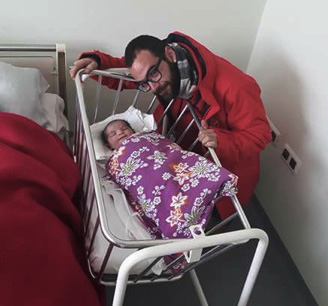 Maxim Gorki once said: „Only mothers can think of the future – because they give birth to it in their children." Thinking of Maxim Gorki’s words, we can add that there are more people who need to be thinking about the future of this baby, like the people in the European Parliament, and other people of power as well. Leaders of European countries should take a step back from their own interests and use dialog to get to the end of this crisis. There are too many people whose lives depend on decisions of a few politicians. Europe is facing a great challenge; the refugee crisis needs a solution, and it needs it quickly before any more people lose their lives. Even though there are many ideas on how to end this crisis, the final solution needs to be political in order for us to see the end of the suffering of innocent people.
Maxim Gorki once said: „Only mothers can think of the future – because they give birth to it in their children." Thinking of Maxim Gorki’s words, we can add that there are more people who need to be thinking about the future of this baby, like the people in the European Parliament, and other people of power as well. Leaders of European countries should take a step back from their own interests and use dialog to get to the end of this crisis. There are too many people whose lives depend on decisions of a few politicians. Europe is facing a great challenge; the refugee crisis needs a solution, and it needs it quickly before any more people lose their lives. Even though there are many ideas on how to end this crisis, the final solution needs to be political in order for us to see the end of the suffering of innocent people.
I have recently met two journalists who write for Christianity Today. They are researching the crisis, traveling along the route the refugees are taking, and talking to people from various organisations, locals, etc. about how to end this crisis. An interesting and popular sentence came up: “We came to pick your brain.” They came to find that the opinion among the people is generally optimistic. They are saying that the crisis can be easily stopped. However, after further inquiry it becomes very evident that it isn’t quite so. How to end the war in Syria? What to do with Turkey and the refugees there? What does Europe need to do with the refugees that area here? And a whole series of other questions come up that do not have easy practical answers. Europe is facing a great challenge – on the one hand, there are the foundations and certain European ethical values, and on the other there are clashes between countries and their opinions about the crisis that are seriously threatening its unity and freedom for which it stands.
Globally, this year did not start off well. From the neo-fascist movements and praise of hydrogen bombs, to the fanatic IS; a lot of people are talking about World war III. God help us!
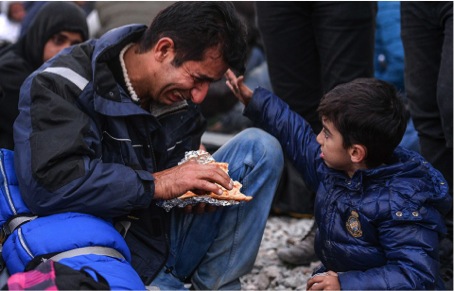 In the midst of this crisis that is the focus of the larger majority of media, there are refugees in search of a safe and warm home.
In the midst of this crisis that is the focus of the larger majority of media, there are refugees in search of a safe and warm home.
Over a week ago the world was celebrating the week of prayer for unity among Christians. The world is divided. And we ask with the Apostle Paul: “Is Christ divided?” Christ is not divided, but those who follow him are. That is unfortunately a sad truth, also in this crisis. A lot of people are claiming to be following Christ, but are spitting out xenophobic statements about people coming from war-stricken areas. Christians are filled with fear of potential terrorists, and some are claiming refugees need to be deported because they are not Christian. It is terrifying to hear. The question poses itself about how well we understand Christ’s teaching and calling.
It would be great to see the Church speak louder about this crisis and the people who need help instead of politicising. Our voice may not put an end to this crisis, but it would raise awareness about the needs and the real situation. We remain hopeful that this will happen.
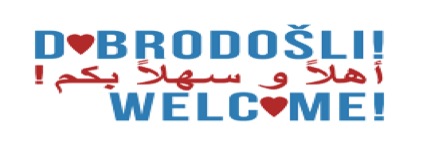 Croatia is also facing difficult problems sprouting from this crisis. On the one hand new migrants and refugees are coming in from the south, and on the other, Germany, Austria and Slovenia are sending people back to Croatia. According to the Croatian law, anyone who refuses to seek asylum in Croatia has 30 days to leave the country. The last group of 50 people sent back from Slovenia is now facing the challenge of what to do when these 30 days pass. They are walking around cities trying to find help from locals. Of course, there are good people responding to their needs. Volunteers from the “Welcome Refugees” initiative are taking people in, sharing their homes, food and gathering funds to help them on their way back.
Croatia is also facing difficult problems sprouting from this crisis. On the one hand new migrants and refugees are coming in from the south, and on the other, Germany, Austria and Slovenia are sending people back to Croatia. According to the Croatian law, anyone who refuses to seek asylum in Croatia has 30 days to leave the country. The last group of 50 people sent back from Slovenia is now facing the challenge of what to do when these 30 days pass. They are walking around cities trying to find help from locals. Of course, there are good people responding to their needs. Volunteers from the “Welcome Refugees” initiative are taking people in, sharing their homes, food and gathering funds to help them on their way back.
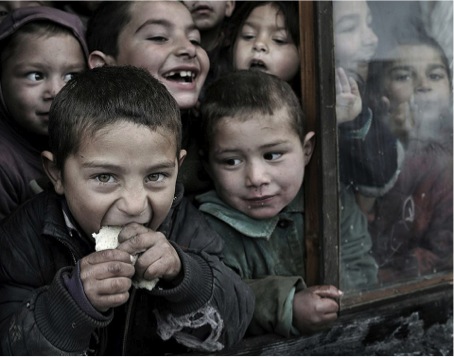 Europe is showing a different face these days, and an article recently published in the New York Times, speaks about that as well. The article was written by young Mohammed al-Jabiry, who was in search of a better life, now found himself in front of Europe’s closed door. The summer before he left Baghdad he said: “I was thinking, ‘I have no job here, and I never finished school.’ I thought of a better future there – that I would find a better job, that I could continue my studies, earn more money.” Unfortunately, that is not what he found here.
Europe is showing a different face these days, and an article recently published in the New York Times, speaks about that as well. The article was written by young Mohammed al-Jabiry, who was in search of a better life, now found himself in front of Europe’s closed door. The summer before he left Baghdad he said: “I was thinking, ‘I have no job here, and I never finished school.’ I thought of a better future there – that I would find a better job, that I could continue my studies, earn more money.” Unfortunately, that is not what he found here.
And it is not just that people are not finding a life they have been looking for, or are being turned away, there are other problems arising: human trafficking, prostitution, drug sales, gun sales, etc. Some days ago I had the opportunity to meet a person that has been involved in the anti-trafficking project for years, through A21 Campaign. We talked for a few hours, and I learned a lot about what has been happening, and what many people are facing. It appears that walking thousands of miles is not the worst part of this story for some people.
Fences on borders of many European countries, divided political opinions, lack of communication and desire for cooperation among countries – that is one side of the story; the one everyone sees. The other, the one volunteers in the refugee camp in Slavonski Brod are facing, is the reality of a constant influx of people in search of a better life in Europe and their very real needs.
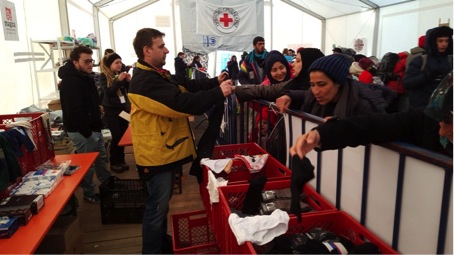 Everyday volunteer activities in the camp range from psychological help to humanitarian aid, and we are facing new challenges. With the coming of the spring, the number of refugees is (and will be) rising, and so are our needs for volunteers and funds. On a weekly basis, with two coordinators and an average of five volunteers we distribute 5000 socks, underwear and shoes. There is so much more to be done.
Everyday volunteer activities in the camp range from psychological help to humanitarian aid, and we are facing new challenges. With the coming of the spring, the number of refugees is (and will be) rising, and so are our needs for volunteers and funds. On a weekly basis, with two coordinators and an average of five volunteers we distribute 5000 socks, underwear and shoes. There is so much more to be done.
The need for these small items is very important. People come to us with wet feet, or no socks, dirty; this is a small spark of light for them. The smiles and the deep gratitude they show when they receive these items gives us volunteers the strength to work, sometimes up to 18 hours a day.
Christianity is about a personal faith in the Savior and a life of holiness and devotion. Christians need to be reminded that this same Savior that gave us this new life that we rejoice in, is calling us to love our neighbors.
May God help us to be sensitive to the needs of others, to be aware and grateful for what we have – our home, food, and God’s provision. May our conscience be touched by the Spirit and our deeds show Christ in us.
Photos: Croatian Baptist Aid
1. This little girl was born in the refugee camp in Slavonski Brod, and was taken care of by our volunteers. Her name is Croatia – after the country she was born in.
2. After 25 days of traveling and surviving, a boy is comforting his father.
3. “Welcome Refugees” initiative CMS.
4. Children in the camp.
5. Distribution of underwear and hats.